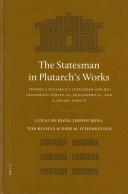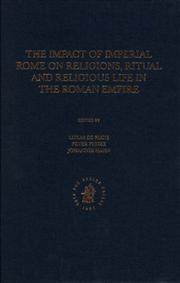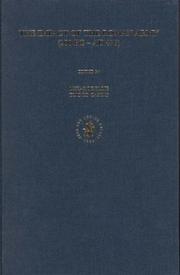| Listing 1 - 6 of 6 |
Sort by
|

ISBN: 1280859504 9786610859504 1429426977 9047405196 1433705605 9781429426978 9004138080 Year: 2004 Publisher: Leiden Boston Brill
Abstract | Keywords | Export | Availability | Bookmark
 Loading...
Loading...Choose an application
- Reference Manager
- EndNote
- RefWorks (Direct export to RefWorks)
This volume presents the second half of the proceedings of the Sixth International Conference of the International Plutarch Society (2002). The selected papers are divided by theme in sections concentrating on statesmen and statesmanship in Plutarch's Greek and Roman Lives . The volume bears witness to the ongoing, wide-ranging interest in Plutarch's biographies.
Plutarch. --- Plutarchus. --- Statesmen --- Biography as a literary form. --- History and criticism. --- Greece --- Rome --- Biography --- Authorship --- Prose literature --- Public officers --- History and criticism --- Technique --- Rim --- Roman Empire --- Roman Republic (510-30 B.C.) --- Romi (Empire) --- Byzantine Empire --- Rome (Italy) --- al-Yūnān --- Ancient Greece --- Ellada --- Ellas --- Ellēnikē Dēmokratia --- Elliniki Dimokratia --- Grčija --- Grèce --- Grecia --- Gret︠s︡ii︠a︡ --- Griechenland --- Hellada --- Hellas --- Hellenic Republic --- Hellēnikē Dēmokratia --- Kingdom of Greece --- République hellénique --- Royaume de Grèce --- Vasileion tēs Hellados --- Xila --- Yaṿan --- Yūnān --- Ελληνική Δημοκρατία --- Ελλάς --- Ελλάδα --- Греция --- اليونان --- يونان --- 希腊
Book
ISBN: 9050633285 9004401628 9789050633284 9789004401624 Year: 2002 Volume: 2 Publisher: Brill
Abstract | Keywords | Export | Availability | Bookmark
 Loading...
Loading...Choose an application
- Reference Manager
- EndNote
- RefWorks (Direct export to RefWorks)
Did a Roman imperial economy exist under the Late Republic, the Roman Principate and the Later Roman Empire? And if so, what type of economy was it? Another equally important question is: did the Roman Empire, by specific actions, the creation of infrastructures, or its very existence, trigger a transformation of economic life in the regions which it dominated? Or was the Empire a marginal affair in the regions that belonged to it, and did economic developments take their own course, independently of the Empire? Questions like these, which are of great consequence to any student of Roman history, archaeology, and Roman law, are treated in this volume, which in its successive parts focuses on: 1. The character of the Roman economy. 2. Economic life in particular regions of the Roman Empire. 3. The economy of the Later Roman Empire.
Rome --- Economic conditions --- Congresses. --- Conditions économiques --- Congrès --- Conditions économiques --- Congrès --- Congresses --- Armed Forces. --- Roman provinces --- Social mobility. --- Administration. --- Rome (Empire) --- Mobility, Social --- Sociology --- State governments --- Armed Services --- Military, The --- Military art and science --- Disarmament --- Rome. --- Rim --- Roman Empire --- Roman Republic (510-30 B.C.) --- Romi (Empire) --- Byzantine Empire --- Rome (Italy) --- Ancient history: to c 500 CE
Book
ISBN: 9050632483 900440161X 9789050632485 9789004401617 Year: 2001 Volume: 1 Publisher: Brill
Abstract | Keywords | Export | Availability | Bookmark
 Loading...
Loading...Choose an application
- Reference Manager
- EndNote
- RefWorks (Direct export to RefWorks)
The title of this volume is ‘Administration, Prosopography and Appointment Policies in the Roman Empire’. The papers contained in this volume focus on all three of these themes, within the context of the impact of the Roman empire upon the regions it dominated. The papers contained in the first part of the volume concentrate on appointment policies, career structures and the impact of military presence and recuitment, esp. in border provinces, in the period of the Principate (27 B.C. – A.D. 284). In the second part of the volume the reader will find papers on Roman jurists, administrators, and bureaucrats and articles about administrative procedures, the administration of justice, rescripts and the influence of learned juridical treatises in various regions of the Roman empire. The last section of the volume presents contributions on the impact of the Roman imperial administration and appointment policies on communal rights and politics, the composition of local councils, local administrative structures, Romanisation, and social mobility of regional and local notables in various provinces of the Roman Empire.
Public administration --- Prosopography --- Magistrates, Roman. --- Administration publique (Science) --- Prosopographie --- Magistrats romains --- Rome --- Officials and employees. --- Army. --- Politics and government --- Fonctionnaires --- Armée --- Politique et gouvernement --- Social mobility --- Justice, Administration of --- Army --- Provinces --- Administration --- Officials and employees --- -Social mobility --- -Mobility, Social --- Sociology --- Administration of justice --- Law --- Courts --- Law and legislation --- -Administration. --- -Rome --- Armée --- Roman provinces --- Mobility, Social --- State governments --- Administration. --- Social mobility - Rome --- Justice, Administration of - Rome --- Rome - Army --- Rome - Provinces - Administration --- Rome - Officials and employees --- Ancient history: to c 500 CE
Book
ISBN: 9050633889 9789050633888 9004401636 Year: 2003 Volume: 3 Publisher: Amsterdam : J.C. Gieben,
Abstract | Keywords | Export | Availability | Bookmark
 Loading...
Loading...Choose an application
- Reference Manager
- EndNote
- RefWorks (Direct export to RefWorks)
From the days of the emperor Augustus (27 B.C.-A.D. 14) the emperor and his court had a quintessential position within the Roman Empire. It is therefore clear that when the Impact of the Roman Empire is analysed, the impact of the emperor and those surrounding him is a central issue. The study of the representation and perception of Roman imperial power is a multifaceted area of research, which greatly helps our understanding of Roman society. In its successive parts this volume focuses on 1. The representation and perception of Roman imperial power through particular media: literary texts, inscriptions, coins, monuments, ornaments, and insignia, but also nicknames and death-bed scenes. 2. The representation and perception of Roman imperial power in the city of Rome and the various provinces. 3. The representation of power by individual emperors.
Emperors --- Power (Social sciences) --- Propaganda --- Empereurs --- Pouvoir (Sciences sociales) --- Propagande --- Congresses. --- Art --- Congrès --- Rome --- Provinces --- Administration --- Politics and government --- Politique et gouvernement --- Propaganda, Roman --- Roman provinces --- Iconography --- Conferences - Meetings --- Imperialisme. --- Economische invloeden. --- Culturele invloeden. --- Romeinse rijk. --- Emperors. --- Power (Social sciences). --- Propaganda, Roman. --- Administration. --- Rome (Empire). --- Congrès --- Congresses --- Political science --- Italy --- History --- Propaganda [Roman ] --- Roman propaganda --- Czars (Emperors) --- Rulers --- Sovereigns --- Tsars --- Tzars --- Kings and rulers --- Emperors - Rome - Congresses --- Power (Social sciences) - Rome - Congresses --- Emperors - Rome - Pictorial works - Congresses --- Propaganda, Roman - Congresses --- Rome - Provinces - Administration - Congresses --- Ancient history: to c 500 CE

ISBN: 9004154604 9789004154605 9786611457747 1281457744 904741134X 9789047411345 Year: 2006 Volume: 5 Publisher: Leiden Boston : Brill,
Abstract | Keywords | Export | Availability | Bookmark
 Loading...
Loading...Choose an application
- Reference Manager
- EndNote
- RefWorks (Direct export to RefWorks)
This volume presents the proceedings of the fifth workshop of the international thematic network ‚Impact of Empire’, which concentrates on the history of the Roman Empire, c. 200 B.C. - A.D. 476, and, under the chairmanship of Lukas de Blois and Olivier Hekster (University of Nijmegen, The Netherlands), brings together ancient historians, archaeologists, classicists and specialists on Roman law from some 28 European and North American universities. The fifth volume focuses on the impact of imperial Rome on religions, ritual and religious life in the Roman Empire. The following topics are treated: connections between Roman expansion and religion, the imperial impact on local cults, cultic personnel (priests, priestesses and bishops), and the divinity of Roman Emperors.
Rome --- Religion --- Congresses --- Religious life and customs --- History --- Congrès --- Vie religieuse --- Histoire --- Religion and state --- Rites and ceremonies --- Conferences - Meetings --- Congrès --- Ceremonies --- Cult --- Cultus --- Ecclesiastical rites and ceremonies --- Religious ceremonies --- Religious rites --- Rites of passage --- Traditions --- Ritualism --- Manners and customs --- Mysteries, Religious --- Ritual --- State and religion --- State, The --- Religious aspects --- Rim --- Roman Empire --- Roman Republic (510-30 B.C.) --- Romi (Empire) --- Byzantine Empire --- Rome (Italy) --- History. --- Religion and state - Rome - History - Congresses --- Rites and ceremonies - Rome - Congresses --- Rome - Religious life and customs - Congresses --- Rome - History - Republic, 510-30 B.C. - Congresses --- Rome - History - Empire, 30 B.C.-476 A.D. - Congresses --- Ancient history: to c 500 CE --- Religion et État --- Rites et cérémonies --- 30 av J-C-476 (Empire)


ISBN: 1281936006 9786611936006 9047430395 9004160442 9789047430391 9789004160446 9789004160446 Year: 2007 Publisher: Brill
Abstract | Keywords | Export | Availability | Bookmark
 Loading...
Loading...Choose an application
- Reference Manager
- EndNote
- RefWorks (Direct export to RefWorks)
To many inhabitants of the Roman Empire the army was the most visible representation of imperial power. Roman troops were the embodiment of imperial control. Military installations and buildings, the imperial guard, other troops, fleets, and militarily tinged works of art brought home the majesty of Rome to anybody who saw them, in Rome and in other parts of the Empire. With Roman armies came administrators, taxes and requisitions in cash and kind, traders, permanently residing veterans and military personnel, useful relations between local notables and Roman military cadre, and chances of upward social mobility. This sixth volume in the series Impact of Empire focuses on these topics.
Rome -- Army -- Economic aspects -- History -- Congresses. --- Rome -- Army -- History -- Congresses. --- Rome -- Army -- Political aspects -- History -- Congresses. --- Rome -- Army -- Religious aspects -- History -- Congresses. --- Rome -- Army -- Social aspects -- History -- Congresses. --- Rome -- History -- Empire, 30 B.C.-476 A.D. -- Congresses. --- Rome -- History -- Republic, 510-30 B.C. -- Congresses. --- Military Science - General --- Military & Naval Science --- Law, Politics & Government --- Rome --- Army --- History --- Economic aspects --- Social aspects --- Political aspects --- Religious aspects --- Rim --- Roman Empire --- Roman Republic (510-30 B.C.) --- Romi (Empire) --- Byzantine Empire --- Rome (Italy) --- Krijgsmacht. --- Romeinse oudheid. --- Roma --- Roma, Askeri tarih --- Romeinse rijk. --- History, Military --- Political activity --- Dini açıdan --- Ekonomik açıdan --- Ordu --- Siyasal katılım --- Tarih
| Listing 1 - 6 of 6 |
Sort by
|

 Search
Search Feedback
Feedback About UniCat
About UniCat  Help
Help News
News